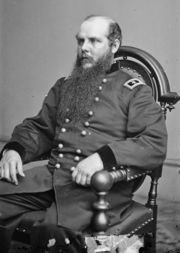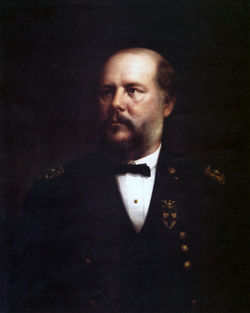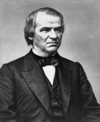John Schofield
| John McAllister Schofield | |
 |
|
|
28th United States Secretary of War
|
|
|---|---|
| In office June 1, 1868 – March 13, 1869 |
|
| President | Andrew Johnson |
| Preceded by | Edwin M. Stanton |
| Succeeded by | John Aaron Rawlins |
|
|
|
| Born | September 29, 1831 Gerry, New York |
| Died | March 4, 1906 (aged 74) St. Augustine, Florida |
| Political party | Republican |
| Alma mater | United States Military Academy |
| Military service | |
| Allegiance | United States of America Union |
| Service/branch | United States Army Union Army |
| Years of service | 1853–1860, 1861–1895 |
| Rank | Lieutenant General |
| Commands | Army of the Frontier XXIII Corps Army of the Ohio United States Army |
| Battles/wars | American Civil War
|
| Awards | Medal of Honor |
John McAllister Schofield (September 29, 1831 – March 4, 1906) was an American soldier who held major commands during the American Civil War. He later served as U.S. Secretary of War and commanding general of the United States Army.
Contents |
Early life
Schofield was born in Gerry, New York, and graduated from the United States Military Academy at West Point in 1853. He served for two years in the artillery, was assistant professor of natural and experimental philosophy at West Point from 1855 to 1860, and while on leave (1860–1861) was professor of physics at Washington University in St. Louis, Missouri.
Civil War
When the Civil War broke out, Schofield became a major in a Missouri volunteer regiment and served as chief of staff to Maj. Gen. Nathaniel Lyon until Lyon's death during the Battle of Wilson's Creek (Missouri) in August 1861. Schofield acted with "conspicuous gallantry" during the battle, and received the Medal of Honor in 1892 for that action.
Schofield was promoted to brigadier general of volunteers on November 21, 1861, and to major general on November 29, 1862. From 1861 to 1863 he held various commands in the Trans-Mississippi Theater, most of the time in command of the Army of the Frontier. He was eventually relieved of duty in the West, at his own request, due to altercations with his superior Samuel R. Curtis.
On April 17, 1863, he took command of the 3rd Division in the XIV Corps of the Army of the Cumberland. He returned to Missouri as commander of the Department of Missouri in 1863. In 1864, as commander of the Army of the Ohio, he took part in the Atlanta Campaign under Major General William T. Sherman.

Sherman, after the fall of Atlanta, took the majority of his forces on a March to the Sea through Georgia. Schofield's Army of the Ohio was detached to join Major General George H. Thomas in Tennessee. Confederate General John Bell Hood invaded Tennessee, and on November 30, Hood managed to attack Schofield's Army of the Ohio in the Battle of Franklin. Schofield successfully fought off Hood and joined his forces with Thomas. On December 15, and December 16, Schofield took part in Thomas's crowning victory at the Battle of Nashville. However, during the buildup towards the battle Schofield intrigued against Thomas, feeding Grant false information, in order to try to succeed his senior in command.[1] For his services at Franklin he was awarded the rank of brigadier general in the regular army on November 30, 1864, and the brevet rank of major general on March 13, 1865.
Ordered to operate with Sherman in North Carolina, Schofield moved his corps by rail and sea to Fort Fisher, North Carolina, in 17 days, occupied Wilmington on February 22, 1865, fought the action at Kinston on March 10, and on March 23, joined Sherman at Goldsboro.
Post-war
After the war, Schofield was sent on a special diplomatic mission to France, on account of the presence of French troops in Mexico. During Reconstruction, Schofield was appointed by President Andrew Johnson to serve as military governor of Virginia.
From June 1868 to March 1869, Schofield served as Secretary of War. President Johnson had forced Edwin M. Stanton, a Radical Republican who had served as Secretary of War since 1862, from his cabinet. Schofield served in an interim capacity until the United States Senate confirmed John Aaron Rawlins. In 1870 he wrote an article criticizing his wartime rival George Thomas, who subsequently died of a stroke while writing a response.
In 1873, Schofield was given a secret task by Secretary of War William Belknap to investigate the strategic potential of a United States presence in the Hawaiian Islands. Schofield's report recommended that the United States establish a naval port at Pearl Harbor.
Starting in 1876 Schofield was superintendent of the United States Military Academy. In 1878, Schofield won the ire of the Radical Republicans when he was asked by President Rutherford B. Hayes to reopen the case of Major General Fitz John Porter, who had been convicted by a court-martial for cowardice and disobedience at the Second Battle of Bull Run. Schofield's board made use of a great amount of new evidence from Confederate generals who had participated in the battle and found that Porter had been wrongly convicted and that his actions might have saved the entire Union army from complete defeat caused by the ineptitude of Maj. Gens. John Pope and Irvin McDowell.
On April 5, 1880, an African American cadet at West Point, Johnson Chesnut Whittaker, was found bruised and beaten in his cot. He claimed that he had been attacked by fellow cadets, but the administration claimed he had fabricated his story to win sympathy. Whittaker was court-martialed and expelled for allegedly faking an assault on himself staged by his fellow cadets. A Congressional investigation into the incident resulted in Schofield's removal from his post as superintendent in 1881.

From 1888 until his retirement in 1895, Schofield was commanding general of the United States Army. He had become a major general on March 4, 1869, and on February 5, 1895, he was commissioned a lieutenant general. Lieutenant General Schofield retired on September 29, 1895 upon reaching the mandatory retirement age of 64.
General Schofield died at St. Augustine, Florida, and is buried in Arlington National Cemetery.[2] His memoirs, Forty-six Years in the Army, were published in 1897. He is memorialized by the military installation Schofield Barracks, Hawaii. Prior to his death, Schofield was the last surviving member of Andrew Johnson's Cabinet.
Today, Schofield is remembered for a lengthy quotation that all cadets at the United States Military Academy at West Point, Officer Candidate School at Fort Benning, and the United States Air Force Academy are required to memorize. It is an excerpt from his graduation address to the class of 1879 at West Point:
The discipline which makes the soldiers of a free country reliable in battle is not to be gained by harsh or tyrannical treatment. On the contrary, such treatment is far more likely to destroy than to make an army. It is possible to impart instruction and give commands in such a manner and such a tone of voice as to inspire in the soldier no feeling, but an intense desire to obey, while the opposite manner and tone of voice cannot fail to excite strong resentment and a desire to disobey. The one mode or other of dealing with subordinates springs from a corresponding spirit in the breast of the commander. He who feels the respect which is due to others cannot fail to inspire in them respect for himself. While he who feels, and hence manifests, disrespect towards others, especially his subordinates, cannot fail to inspire hatred against himself.
– John M. Schofield
Medal of Honor citation

Rank and organization:
- Major, 1st Missouri Infantry. Place and date: At Wilsons Creek, Mo., August 10, 1861. Entered service at: St. Louis, Mo. Born: September 29, 1831, Gerry, N.Y. Date of issue: July 2, 1892.
Citation:
See also
- List of Medal of Honor recipients
- List of American Civil War Medal of Honor recipients: Q–S
- List of American Civil War generals
References
- Schofield, John M. Forty-Six Years in the Army, The Century Co., 1897
- Eicher, John H., and Eicher, David J., Civil War High Commands, Stanford University Press, 2001, ISBN 0-8047-3641-3.
- McDonough, James L. "John Schofield as Military Director of Reconstruction in Virginia.," Civil War History, Sept 1969, Vol. 15#3, pp 237–256
 This article incorporates text from a publication now in the public domain: Chisholm, Hugh, ed (1911). Encyclopædia Britannica (Eleventh ed.). Cambridge University Press.
This article incorporates text from a publication now in the public domain: Chisholm, Hugh, ed (1911). Encyclopædia Britannica (Eleventh ed.). Cambridge University Press.
- ↑ Bobrick, Benson, Master of War: The Life of General George H. Thomas, Simon & Schuster, 2009, ISBN 978-0-7432-9025-8, page 287-288, 329-331, 336-337.
- ↑ Eicher, pp. 472-73.
- ↑ ""Civil War Medal of Honor citations" (S-Z): Schofield, John M.". AmericanCivilWar.com. http://americancivilwar.com/medal_of_honor8.html. Retrieved 2007-11-09.
- ↑ ""Medal of Honor website” (M-Z): Schofield, John M.". United States Army Center of Military History. http://www.history.army.mil/html/moh/civwarmz.html. Retrieved 2007-11-09.
External links
 "Schofield, John McAllister". Appletons' Cyclopædia of American Biography. 1900.
"Schofield, John McAllister". Appletons' Cyclopædia of American Biography. 1900.- "John Schofield". Claim to Fame: Medal of Honor recipients. Find a Grave. http://www.findagrave.com/cgi-bin/fg.cgi?page=gr&GRid=1917. Retrieved 2007-11-08.
| Military offices | ||
|---|---|---|
| Preceded by none |
Commander of the Army of the Frontier October 12, 1862 - March 30, 1863 |
Succeeded by James G. Blunt |
| Preceded by Thomas H. Ruger |
Superintendents of the United States Military Academy 1876–1881 |
Succeeded by Oliver O. Howard |
| Preceded by Philip H. Sheridan |
Commanding General of the United States Army 1888–1895 |
Succeeded by Nelson A. Miles |
| Political offices | ||
| Preceded by Edwin M. Stanton |
United States Secretary of War Served under: Andrew Johnson June 1, 1868 – March 13, 1869 |
Succeeded by John Aaron Rawlins |
|
||||||||||||||||
|
||||||||||||||||||||||||||||
|
|||||||||||||




